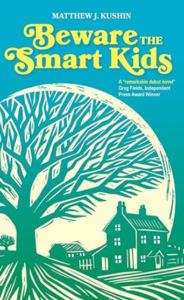Today’s special guest is YA author Matthew J. Kushin to chat about his new coming-of-age young adult book, Beware the Smart Kids.

Bio:
Matthew is a professor of communication at Shepherd University where he teaches new media courses, including a course on happiness and media use. He’s passionate about spreading civility, kindness, and happiness in the world. When not reading or writing, he is doing more of what makes him happy—spending time with his family, bouldering, listening to music, hiking, paddle boarding, and playing retro video games. He works with the Stubblefield Institute for Civility Political Communication.
Welcome, Matthew. Please tell us about your current release.
Beware the Smart Kids is a story about finding happiness.
It’s the story about a troubled teenager, an ex-convict, and the search for happiness.
The teenager, Nolan, learns about happiness through a series of lessons from the ex-convict, Mr. Barno.
The book is Goodwill Hunting meets Tuesday’s with Morie.
Mr. Barno’s lessons are largely inspired by research on happiness. I’ve put together some resources the research and wisdom behind the lessons: https://mattkushin.com/happiness/
Here’s the synopsis:
Misfit troublemaker Nolan Sussman badly wants two things before high school ends: the attention of Gabi Meyers and the return of his runaway sister, Sarah.
But when his latest prank goes awry, Nolan is nearly expelled. He’s forced to spend his summer doing yardwork for Mr. Barno, a reclusive former high school teacher who spent 25 years in prison.
Nolan soon finds that despite the tragic mistake that landed Mr. Barno in prison, the old man has something even more elusive than Gabi and Sarah—happiness.
Now, Nolan is determined to learn how to be happy, too. It’s his chance to matter. His shot at a future. But secrets in Mr. Barno’s past are preventing the once-beloved educator from having the will to ever teach again. Secrets the two outcasts will have to face together.
What inspired you to write this book?
I’m a professor and I’ve been teaching college for a long time. I’ve witnessed the rise of the mental health crisis among young people. That, and my own search for deeper meanings during the pandemic, inspired me to create a class on happiness and media use. It was really popular. I wanted to find out a way to take some of the key lessons that I’d learned in creating the class and find a way to reach a wider audience. Stories are the ultimate vehicle for doing that. That was the seed that grew into this novel.
What exciting project are you working on next?
I’m starting new young adult novel set in the year 1999. The writing has been going slow, but I hope to get back to it once things settle down with the launch of Beware the Smart Kids . The new story is a buddy story. It’s told in multiple perspectives through the eyes of two teenagers at an artsy boarding school in Appalachia. They’re lives are moving in different directions, and each is secretly in love with the other, but the timing has never worked out… until one of them is thrown into a time loop.
When did you first consider yourself a writer?
Oh, wow, that’s a tough one. I think the first time I had an article published in a newspaper. I felt validated. Seeing my name in print was exhilarating. I still have the few articles I wrote during a brief stint when I was exploring the possibility of a career in journalism.
Do you write full-time? If so, what’s your workday like? If not, what do you do other than write and how do you find time to write?
I don’t write full-time. My main job is as a professor. But I do a lot of writing as part of my primary job. I’ve written several research articles that have been published in academic journals. I maintain a blog about teaching. I wrote a book about teaching. Gaining all of that experience has really helped me improve as a writer, especially on the self-editing side.
Life as a professor can be extremely busy at times. I try to carve out time to write when my schedule looks fairly open—there are slower weeks during the semester at times. I shut my door, put on some music, and eek out what I can.
Summers are, in theory, also a great time to write when you’re a professor. Alas, it doesn’t always work out. This past summer, I thought I was going to complete a full draft of the new novel I am working on that’s set in the year 1999. I only managed to finish about 25% of it.
To me, it’s about moving forward. There may be weeks where I don’t get to write, and then there will be weeks when I write nearly every day. As long as I move forward, I know that the story will eventually all end up on the page.
What would you say is your interesting writing quirk?
I wrote on a computer, but I tend to edit on my phone a lot. I’m obsessive about each little section of a story. I really enjoy making little tweaks, combing through a piece over and over. I get a thrill out of cutting a few words or changing how something is phrased to be more impactful. It’s like a little ‘ding’ goes off in my head when I save those changes.
I used to hate editing. Now, it’s one of my favorite things to do.
As a child, what did you want to be when you grew up?
In sixth grade, I wrote my first story and decided I wanted to be a writer.
Anything additional you want to share with the readers?
Thank you so much for the opportunity to be interviewed, Lisa!
It’s been a pleasure, Matthew. Thanks for being here.
